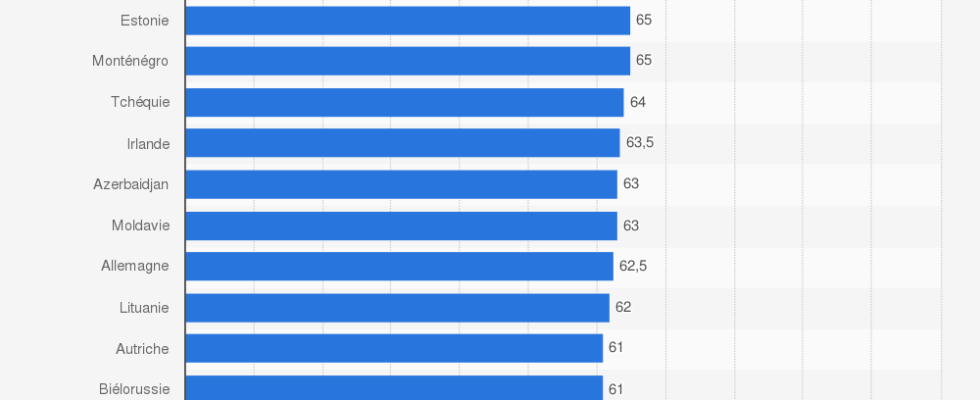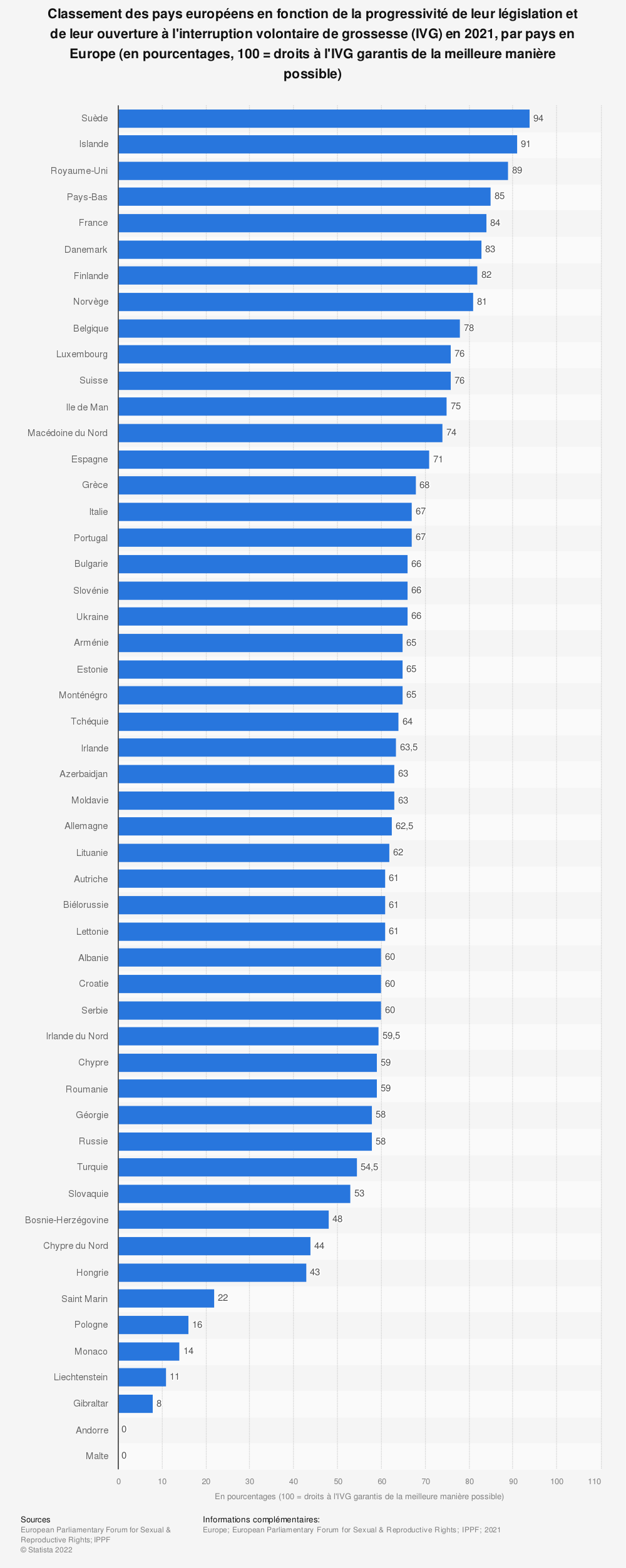If, on paper, most European countries authorize abortion, on the ground, the reality is much more complex. The European Parliament called a year ago for the right to abortion to be included in the EU Charter of Fundamental Rights to guarantee it, but the initiative is unlikely to succeed.
“ For me, it’s incomprehensible: in Europe we have standards for bananas and carrots, and even a standard for a universal charger. But not for women’s rights! Protests Robert Biedron, Polish Socialist MEP. Why couldn’t a Polish, Maltese or Italian woman have the same rights as a French, Belgian or Spanish woman? »
In fact, there is no specific European legislation on abortion. Health, like sexual health, falls within the competence of the Member States. The European Union’s room for maneuver is therefore limited, even if binding texts can be adopted at European level. As is the case, for example, with the standards on tobacco, which notably limit the tar content, and on which the national regulations are based.
For its part, the Charter of Fundamental Rights of the European Union, sort of declaration of human rights at EU level, does guarantee the right to private and family life, as well as the right to health, but it does not explicitly mention abortion.
March 8, 2022, women’s rights day, alarmed ” unacceptable setbacks “observed” these last years In some countries, the French President, who was then President of the Council of the European Union, had therefore pleaded for the inclusion of this right in the charter, “ because we have no right to regress he had said.
Disparities between countries
Because if in most of the 27 countries of the EU, abortion is legal without conditions, this apparent uniformity hides a more contrasting reality. Especially since if we can note among the advances, the legalization of abortion in Ireland in 2018, these last years have been especially marked by setbacks or attempts at restrictions in several countries, from Eastern Europe especially.
On paper, only Malta and the Principality of Andorra still completely prohibit abortion, whatever the circumstances. But in Poland, abortion has become almost impossible. Since 2020, abortion has only been authorized in the event of danger to the life of the pregnant woman, rape or incest. And effective access to this right is often hampered.
In Hungary, a decree that came into force in 2022 forces women wishing to have an abortion to listen to the heartbeat of the fetus. In Slovakia, the right to abortion has suffered in recent years from multiple attempts to restrict access to it.
Some countries have not even had to tighten their legislation. Access to abortion is in fact limited in reality. This is the case in Italy. While Italian women have had the right to abort up to the twelfth week of pregnancy since 1978, in 2020, the Ministry of Health established that 64.6% of gynecologists refused to perform abortion due to conscientious objection. At the same time, the number of clandestine abortions was estimated at 15,000. And the coming to power of Giorgia Meloni has again raised fears for access to abortion, even if she assured during her campaign that she would not touch the law on abortion. The Italian peninsula is not an isolated case: in Croatia, en 2018, a study revealed that 59% of obstetrician-gynecologists in the country refused to perform abortions by exercising their conscience clause. Within the EU, sOnly Sweden, Finland and Lithuania do not allow caregivers to refuse abortion.
On June 24, the repeal of Roe v. Wade in the United States which guaranteed women the right to abortion throughout the country is a shock. In the aftermath, the Parliament adopts on July 7 a resolution calling for the inclusion of abortion in the European Charter of Fundamental Rights by 324 votes for, 155 against and 38 abstentions.
Abortion: a fragile and contested right in many parts of the world
A positive signal, especially as cThis charter, signed in 2000, has the value of a treaty. As such, it is legally binding. Problem, on the other hand: as it has value of treaty, to modify it requires to open the site of the revision of the treaties, which is not yet on the agenda. Not to mention that the procedure for revising the treaties requires the unanimity of the States, each having the right to veto. From what to conclude, like Bruno de Witte, professor of European Union law at the University of Maastricht, in an article from the EURACTIV website, specializing in European affairs, that this initiative has very little chance of succeeding. And the European elections looming in less than a year, on June 9, 2024, make the equation even more uncertain.
In January 2022, Maltese Roberta Metsola who has never hidden her anti-abortion convictions, like her country where Catholicism is the state religion and abortion is considered a crime, was elected president of Parliament. Forty-three years after Simone Veil, the signal made its defenders fear the worst. But the conservative removed the doubt after her election, assuring that as president of the Parliament, she would defend the position carried by the Parliament: “ On this issue, Parliament’s position is unambiguous and unequivocal, and it is also my position “, she said at a press conference. The island’s Parliament is currently debating a possible relaxation of the law which would authorize abortion if the life or health of the mother were seriously threatened.
“ Backclash »
In the press release following this vote, MEPs also said “ preoccupied by a possible increase in funding for anti-gender and anti-choice groups around the world, including in Europe » and they urged ” Member States to decriminalize abortion and to remove and combat the legal, financial, social and practical obstacles which still hinder it in certain Member States “.
Some European parliamentarians do not hesitate to describe a context of “ backclash “, which can be translated as “a conservative backlash”: ” There are attempts to introduce the same type of legislation as in Poland in other countrieswarns the Polish Robert Biedron, president of the Commission for Women’s Rights and Gender Equality. We live in a patriarchal world where women’s bodies have always been a battleground for controlling power. »
The French MEP Irène Tolleret denounces for her part the ” pressures » which are felt in Parliament: I never thought I would see this when I was elected, but we are witnessing a rise in populism which is accompanied by a regression on women’s rights “. She currently notes, a return to the narrative around pronatalist policies “.
MEP Renew recalls this anti-abortion conference organized on November 23, 2022 by conservative MEPs in the European Parliament, with the unambiguous title:“ Opposing Abortion in the United States and Europe: The Way Forward “. Among the organizers, the NGO European Center for Law and Justice, which presents itself as a human rights organization, but positions itself openly against abortion. But also Margarita de la Pisa Carrion, a Spanish MEP from the far-right Vox party, author of a spectacular push in the local elections in May. In Spain, this ultra-conservative party has already stepped up to the plate on abortion. In Castile and Leon, where they lead with the Popular Party, he had thus proposed at the beginning of the year that doctors make the fetus heard by women wishing to have an abortion. A proposal which was not followed by his conservative ally but which sets the tone. Vox also opposes the law adopted in 2022 which opens the right to abortion for minors over the age of 16 without parental authorization and removes the three-day reflection period previously mandatory with an abortion.
“ Anti-abortion lobbies are highly organized “, also assures Irène Tolleret. In a 2018 reportthe Parliamentary Forum for Sexual and Reproductive Rights (EPF), a network of European parliamentarians committed to the protection of sexual and reproductive health and rights, highlighted the key role of ” European agenda”. Under the program ” restore the natural order», this movement of a hundred associations aims to change existing laws on human rights, sexuality and reproduction, such as the right to divorce, the right to contraception or abortion, explains the report in the introduction . According to the EPF, European funding for this type of movement has increased by almost 200% between 2009 and 2018. More than 700 million euros have been paid in support of anti-abortion organizations for the purposes of social mobilization and political lobbying.
Unable to speak with one voice, the European Union remains powerless. Parliament is reduced to voting resolutions condemning “ the de facto ban on abortion in Polandand ask the Polish government to ensure that no more women die because of this restrictive law. “ We have to oppose these setbacks, we must act to secure women’s rights “, still pleads the Polish MEP Robert Biedron, for whom abortion is indeed a “ political issue more than society. ” It is up to us politicians to change things. According to a poll carried out at the beginning of March, more than eight out of ten Poles are in favor of liberalizing the law on abortion.
A woman still died at the end of May as a result of sepsis for lack of therapeutic abortion after the death of the fetus in her womb. ” It’s absurd: it’s 2023 and we still allow women in the European Union to die because of a barbaric law », he laments. But he remains determined: If we are able to have common standards on phone chargers and bananas, I’m sure we can also come to an agreement on women’s rights. ! »

